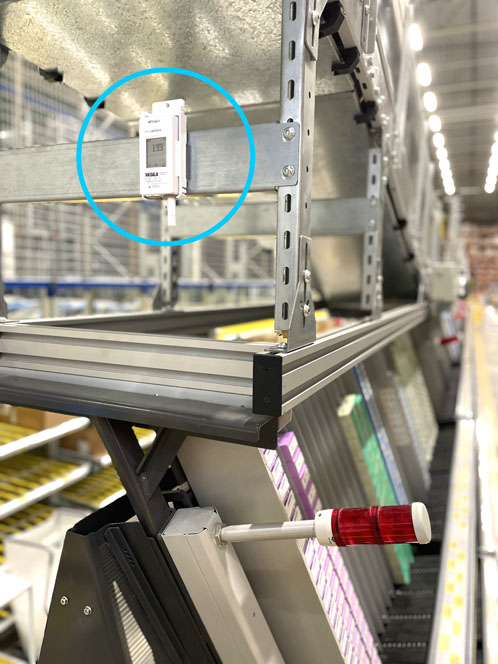In compliance with numerous life science industry requirements, such as good distribution practice (GDP) regulations, the internal environment of this facility is carefully controlled to protect the large numbers of products that are processed every day.
The warehouse is highly automated and has recently been equipped with an advanced network of humidity and temperature loggers from Vaisala.
The requirement to update the monitoring network was prompted by a previous supplier’s “end of life" notification in early 2022. Several potential technology providers were then contacted, including Vaisala, who provided a demonstration of its wireless continuous monitoring and alarm system (viewLinc).
Background
PostNord TPL is a part of the PostNord group and is the leading third-party logistics supplier in Sweden and the Nordic countries. The company offers the Nordic market innovative and cost-effective logistic solutions all the way from producer to consumer.
PostNord TPL has of a warehouse area of roughly 700,000 m2. It employs approximately 3000 people and, in 2022, had a turnover of 3.2 billion SEK.
As key elements within pharmaceutical supply chains, PostNord TPL’s warehousing and distribution facilities operate under strict GxP requirements, which include — amongst other things — a necessity to continuously monitor the internal environment of storage areas and to implement appropriate alarm systems.
Anyone engaged in the wholesale distribution of medicinal products in the European Economic Area must hold a wholesale distribution authorisation issued by the national competent authority of the Member State where these activities are done.

The same national authority is responsible for inspecting the wholesale distributor, which must comply with EU GDP to obtain a wholesale distribution authorisation.
System requirements
The imminent demise of the earlier system provided PostNord TPL with an opportunity to evaluate the latest technologies and solutions on the market. PostNord TPL’s Project Manager, Tina Fritzson, says: “First and foremost, the new monitoring network needed to fulfil our GDP requirements."
"To achieve this, it needed to be accurate and reliable, because the previous system had regularly delivered false alarms … which wastes a lot of time. In addition, the requirement for wiring should be minimal and, ideally, the system should be intuitive so that it’s simple to operate.”
Why Vaisala?
Vaisala Sales Manager Janne Halonen has been involved with the PostNord TPL project from the beginning. He says: “It was clear from our first meeting that we would be able to offer PostNord TPL a significantly superior system. viewLinc is more than capable of meeting their key requirements and our validation service provides all the necessary information to demonstrate GDP compliance,” Janne explains.
“In early 2022, PostNord TPL provided us with floorplans so that we were able to build a detailed proposal to meet their precise requirements,” he adds. “Later that year, we were delighted to be awarded the contract, which included the installation and commissioning of 102 sensors monitoring a 30,000 m2 warehouse."
"Most of the sensors monitor temperature and humidity in this very large facility, but some are also deployed in refrigerated areas that must maintain certain pharmaceutical products at 2–8 °C.”
Reflecting on the system’s performance to date, Janne says: “Since installation, the viewLinc system has worked very well and I am confident that we have exceeded PostNord TPL’s expectations."
"In addition to reliable GDP compliance with a full audit trail, one of the main benefits of the system has been problem-free operation; the old system used to deliver false alarms on a daily basis, but that no longer happens.”
“Ease of use is also a major advantage; we typically find that new operators require less than an hour’s training. A further feature, that I know PostNord TPL has found useful, is viewLinc’s facility to define the path for alarm messages so that only those that need to be alerted are notified.”
Data management
The Vaisala data loggers gather readings every minute, 24/7, and data are transferred to a central server by Vaisala’s proprietary VaiNet wireless technology.
VaiNet access points create links between Ethernet and Vaisala devices; and, whenever a new data logger is added to the system, it is automatically identified by an access point, which forwards the data logger’s information to the server.
Once accepted by the system, data loggers remain synchronised and redundancy is achieved by allowing load distribution between VaiNet access points which share multiple in-range data loggers.

The Vaisala loggers also store information for 30 days to protect data integrity in case there is a network outage. The whole system is managed by Vaisala’s viewLinc enterprise server software, which assimilates the data, provides alarms, real-time data trends and GDP compliance reports.
Users can access the viewLinc system with any web-enabled device and a high level of security is maintained with encrypted communications and automatic data origin checks.
Measurement technology
Vaisala’s RFL100 data loggers at PostNord TPL are equipped with probes containing either temperature sensors or sensors for both temperature and humidity. The probes are detachable and simple to switch out for calibration.
The viewLinc software detects probe changes and automatically updates the probe information to maintain accurate and complete historical records.
The temperature sensors are platinum Pt100 and Pt1000, and the RH probes employ Vaisala’s HUMICAP technology.
Temperature measurements do not generally suffer from drift, but traditional humidity sensors do, so Vaisala’s HUMICAP sensors are preferable because of their long-term stability and insensitivity to interferences such as dust and condensation.
These thin-film capacitive humidity sensors have become the industry standard in a wide variety of applications where long-term accurate, reliable, maintenance-free humidity measurements are required.
Summary
The Vaisala viewLinc system has now been operational since the autumn of 2022. Looking back, PostNord TPL’s Tina Fritzson says: “We have been very pleased with the Vaisala system."
"The support from Janne and the field engineers has been very good; we no longer suffer from false alarms, the system is easy to operate, report generation is quick and simple. And, with accurate, verified monitoring data, our GDP compliance is ensured.”
